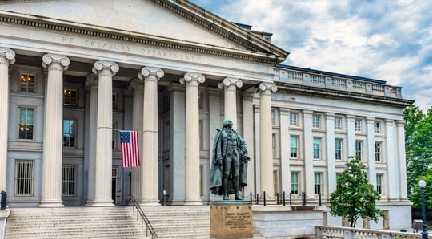
30 May 2023; MEMO: The US Treasury Department announced, Tuesday, on two Syrian money service businesses and allies of Hezbollah and the Islamic Revolution Guard Corps-Qods Force (IRGC-QF) for secretly helping the regime under Bashar Al-Assad maintain access to the international financial system in violation of international sanctions, Reuters reports.
The Treasury's Office of Foreign Assets Control (OFAC) designated Al-Fadel Exchange, headquartered in Damascus, which has facilitated millions of dollars in transfers since 2021 to accounts at the US-designated Central Bank of Syria that benefit the Syrian government and Al-Assad , according to a statement by the Agency.
The US also sanctioned Al-Adham Exchange Company, headquartered in Damascus, which facilitated millions of dollars in transfers since 2021 to accounts at the Central Bank of Syria that directly benefit the Syrian government and Al-Assad.
OFAC is also designating three brothers, Fadel Ma'ruf Balwi (Fadel Balwi), Mut'i Ma'ruf Balwi (Mut'i Balwi) and Muhammad Ma'ruf Balwi (Muhammad Balwi) who own and operate Al-Fadel Exchange.
READ: Official: Iran wants to upgrade Syria's air defence system
The brothers were the only individuals authorised by the Central Bank of Syria to work on behalf of Hezbollah. Fadel Balwi and Muhammad Balwi moved billions of Syrian pounds within Syria in 2022 on behalf of the Syrian government, according to the Agency.
As of late 2022, the Al-Adham Exchange Company regularly moved money abroad for the Central Bank of Syria.
"These designations are pursuant to Executive Order (EO) 13582 of 17 August, 2011, 'Blocking Property of the Government of Syria and Prohibiting Certain Transactions With Respect to Syria', and also the Caesar Syrian Civilian Protection Act 2019 ('Caesar Act'), and underscore the serious threat posed by actors in the financial system who actively enable violent regimes to circumvent sanctions," said the Treasury Department.
Persons that, in certain transactions with those designated Tuesday, may be exposed to sanctions or subject to an enforcement action, it said.
The sanctions build on wider efforts to deny Hezbollah and Iran the financial resources used to sustain malign activities in the region, US State Secretary, Anthony Blinken, said in a separate statement.
"Any foreign person who knowingly provides significant financial, material or technological support to, or engages in a significant transaction with the Government of Syria, puts themselves at risk of US sanctions," he said.




